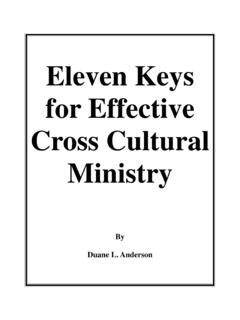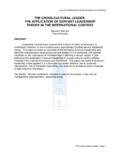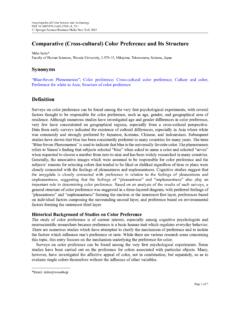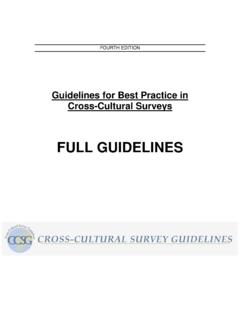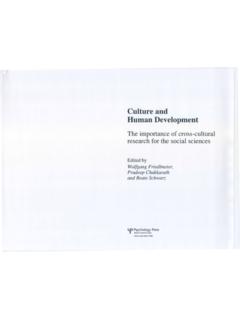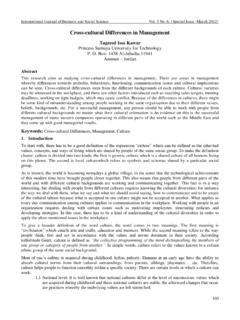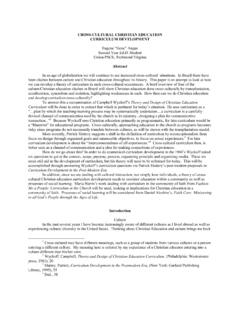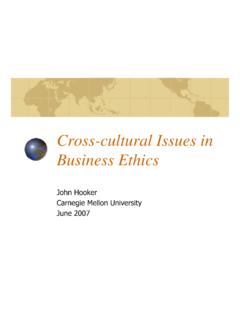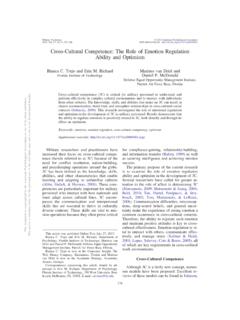Transcription of Assessment Tools of Intercultural Communicative …
1 87 Assessment Tools of Intercultural Communicative competence Alvino E. Fantini, Brattleboro, VT 2006 American Council on the Teaching of Foreign Languages (ACTFL) Proficiency Scale This scale assesses the level of language attainment achieved. (Liskin-Gasparro, 1982) Assessment of Intercultural competence (AIC) This self Assessment tool , designed in a YOGA Format (self- and other Assessment ) charts the development of Intercultural sojourners over time, and provides normative, formative, and summative indicators. (See preliminary version at < > in the SIT Occasional Papers Series, Inaugural Issue, Spring 2000, scroll down to , A Central Concern: Developing Intercultural competence ) For a more complete and updated version, 2005, contact: Australian Second Language Proficiency Ratings (ASLPR) This scale, developed by Ingram and Wylie in 1982, groups various components of language use together in a single band descriptor to assess second language proficiency.
2 Behavioral Assessment Scale for Intercultural Communication (BASIC) Olebe, M., & Koester, J. (1989). Exploring the cross - cultural equivalence of the Behavioral Assessment Scale for Intercultural Communication. International Journal of Intercultural Relations, 13(3), 333-347. Eight scales; validated with 263 university students. Beliefs, Events, and Values Inventory (BEVI) Craig N. Shealy, PhD. James Madison University Designed to identify and predict a variety of developmental, affective, and attributional processes and outcomes that are integral to Equilintegration Theory (ET), which seeks to explain the processes by which beliefs, values, and worldviews are acquired and maintained, why their alteration is typically resisted, and how and under what circumstances their modification occurs. In context of EI theory, the BEVI would appear to be highly suitable for the Assessment of international learning.
3 Ultimately the BEVI is designed to determine whether, how and to what degree people are (or are likely to be) open to various transformational experiences such as international education. Inventory: A self-report measure of multicultural competencies Journal of Counseling Psychology, 41(2), 137-148. Developed for the counseling milieu. Emphasizes behaviors. Four factors. Large sample. cross - cultural Adaptability Inventory (CCAI) Dr. Colleen Kelley & Dr. Judith E. Meyers. CCAI is designed to help participants understand the qualities that enhance cross - cultural effectiveness, whether or not to work in a culturally diverse company, whether or not to live abroad, and how to prepare to enter another culture. Measurement: The CCAI measures 4 variables: Emotional Resilience, Flexibility and Openness, Perceptual Acuity, and Personal Autonomy.
4 Intercultural Press The cross - cultural Assessor A personal navigator for successful communication across cultures. This multimedia program measures, builds and manages cross - cultural skills and characteristics, through the use of exercises and questionnaires. Counseling Inventory LaFromboise, T. D., Coleman, H. L., & Hernandez, A. (1991). "Development and factor structure of the cross - cultural Counseling Inventory--Revised." Professional Psychology: Research and Practice, 22(5), 380-388. Developed for the counseling milieu. cross - cultural Sensitivity Scale (CCSS) Pruegger, V. J., & Rogers, T. B. (1993). "Development of a scale to measure cross - cultural sensitivity in the Canadian context." Canadian Journal of Behavioural Science, 25(4), 615-621. Normed on undergraduate students. 88 cultural competence Self- Assessment Instrument This instrument helps identify, improve and enhance cultural competence in staff relations and client service delivery.
5 (Washington, , Child Welfare League of America Publications; 1993; Catalogue number 5065) cultural competence Self- Assessment Questionnaire (CCSAQ) Mason, J. L. (1995). Portland State University. Instrument designed to assist service agencies working with children with disabilities and their families in self- evaluation of their cross - cultural competence . Intended for US domestic use. Culture-free Scale This instrument, developed by Chen and Starosta, measures Intercultural sensitivity. The cultural Orientations Indicator (COI ) TMC s COI is a web-based cross - cultural Assessment tool that allows individuals to assess their personal cultural preferences and compare them with generalized profiles of other cultures. The COI provides respondents with a personal cultural profile based on ten dimensions that have particular application in the business world.
6 The understanding gained from the personal profile, which is based on TMC s cultural Orientations Model (COM ), can be applied to the development of specific business, management, sales, marketing, negotiation and leadership skills, among others, when applied in multicultural situations. A validated report is available upon request. Self-Awareness Test This simple three-question test helps identify high and low-context characteristics in those who take it. (The Management Center, Graduate School of Business, University of St. Thomas, Minneapolis, MN). The Culture in the Workplace Questionnaire is derived from the work of , and enables you to learn your own cultural profile and how that might compare to others. Communication Index (Developed from Kealy study) This field instrument was used to assess the quality of communication and the accuracy of perception between Canadian advisors and their national counterparts working on a development project.
7 This index represents 30 scenarios related to such issues as project progress and adaptation skills. Instrument also designed as a problem-solving tool . Dogmatism Scale Milton Rokeach, 1960 Educoas, Editorial February 2002 Maintains the premise that the Internet holds great promise as a tool to foster Intercultural communication to create responses to development needs in the Hemisphere. Language Portfolio This tool , developed by the Council of Europe in collaboration with the Common European Framework, uses three parts (a passport, a language biography and a dossier) to self-assess Intercultural competence (Karen-Margrete Frederiksen, Foreword: Intercultural competence ). Expatriate Profile (EP) - Park Li Group. (1996). Expatriate profile workbook. (Second ed.). New York: Author. Expatriate Profile is a computer-based cross - cultural competence self- Assessment instrument for international professionals.
8 Foreign Assignment Success Test (FAST) Black, J. S. (1988). Work role transitions: A study of American expatriate managers in Japan. Journal of International Business Studies, 19(2), 277-294. Six scales. Validated on 67 American managers in Japan. Fuld & Company, Inc. Competitive Intelligence (CI)CI Learning Center & Tools Test: Global Awareness Profile J. Nathan Corbitt. The GAP measures how much world knowledge a person has concerning selected items about international politics, economics, geography, culture, etc. Intercultural Press, ISBN 1-877-864-55-2 Box 700 Yarmouth, ME 04096 USA 89(866)-372-2665 Global Behavior Checklist Hett, 1991 Global Interface Licensed to administer and interpret the following Assessment Tools : --Overseas Assignment Inventory (OAI) A self-response questionnaire that examines 14 attitudes and attributes correlated with successful cross - cultural adjustment and performance.
9 Used together with a behavioral interview, the OAI provides essential input to the expatriate selection process and helps expatriates raise their awareness of a number of important adaptation issues. -- Intercultural Development Inventory (IDI) Designed to provide useful and valid information regarding respondents' orientation toward cultural differences and their readiness for Intercultural training and development. Used in conjunction with training, the IDI is a highly reliable, valid, cross - cultural measure of Intercultural sensitivity applicable to a variety of groups of people from different cultural backgrounds. --Trompenaar's Seven Dimensions of Culture and Corporate Culture Profiles: By means of a questionnaire developed by Dr Alfons Trompenaars, individuals receive their own cultural profile on each of seven dimensions of culture that then can be compared with the cultural profile of any other group or individual in an expanding database of over 35,000 managers.
10 --Objective Job Quotient System (OJQ) A computer-assisted tool that provides cross -culturally appropriate 360 feedback to evaluate and rank employee performance. The OJQ uses multiple raters and ""scaled direct comparisons"", providing greater reliability and validity. Literacy Survey National Geographic Survey Global Mindedness Scale Hett, 1991 The Global Team Process Questionnaire (GTPQ), a proprietary instrument developed by ITAP International, helps global teams improve their effectiveness and productivity. and Associates cross cultural Adaptability Inventory (CCAI) A self- Assessment questionnaire that measures an individual's adaptability in four dimensions that may affect his or her ability to have a successful experience in another culture. These are Emotional Resilience, Flexibility/Openness, Perceptual Acuity, and Personal Autonomy.
